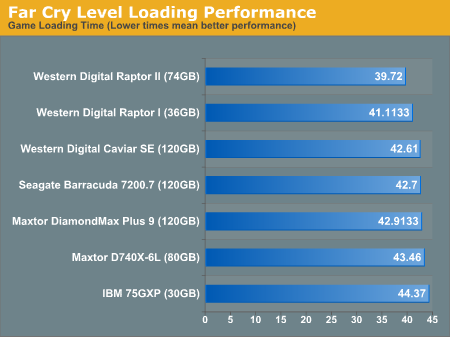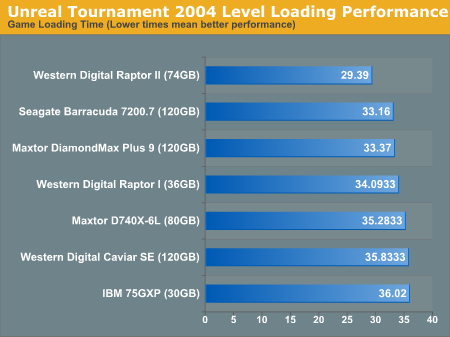Q2 2004 Desktop Hard Drive Comparison: WD Raptor vs the World
by Anand Lal Shimpi on June 7, 2004 12:05 AM EST- Posted in
- Storage
Game Loading Performance
One test that everyone wants to see when it comes to hard disk reviews is something game-related. For the most part, gamers agree that your hard drive isn't limiting performance while you're actually playing a game. After all, if you are swapping to disk a lot, then your gaming experience is going to be pretty poor, regardless of how fast your disk is. But what is important and very noticeable when it comes to disk performance in games are loading times.
Today's games have arguably some of the worst loading times ever, thanks to extremely large artwork, levels and other game data that must be loaded before game play can begin. Games also provide a very tangible and perceivable platform for hard disk performance comparison; while even Winstone scores may be difficult to relate to, everyone knows what waiting longer feels like.
For our game loading tests, we used two games: Far Cry and Unreal Tournament 2004. Both games were installed, in full, to the hard drive. We then used no-CD patches to prevent any accessing of the CD/DVD drive to skew the loading process. Both games were installed to a clean drive without anything else present on the drive (the OS is located on a separate drive).
Our Far Cry test consists of starting a campaign with the default difficulty level, hitting escape to skip the introductory movie and beginning the stop watch timer at first sight of the loading screen. The stop watch timer is stopped as soon as the loading screen disappears. The test is repeated three times with the final score reported being an average of the three. In order to avoid the effects of caching, we reboot between runs. All times are reported in seconds, lower scores obviously being better.

The benefits of a 10,000RPM spindle speed are not much when just looking at the first generation Raptor, but the new Raptor manages to offer a 6% performance advantage even over the current generation 7200RPM 8MB cache drives.
Our Unreal Tournament 2004 test uses the full version of the game and leaves all settings on defaults. After launching the game, we select Instant Action from the menu, choose Assault mode and select the Robot Factory level. The stop watch timer is started right after the Play button is clicked, and stopped when the loading screen disappears. The test is repeated three times with the final score reported being an average of the three. In order to avoid the effects of caching, we reboot between runs. All times are reported in seconds, lower scores obviously being better.

The UT test shows similar standings (although there is a bit of swapping amongst the 7200RPM 8MB cache contenders), but the 2nd generation Raptor extends its lead over its predecessor significantly. The first generation Raptor is even slightly outpaced by Seagate's 7200.7 series.










50 Comments
View All Comments
SoBizarre - Monday, June 7, 2004 - link
<<I wonder how these drives compare to my Seagate X15?Try the link below and cry... ;)
http://storagereview.com/php/benchmark/compare_rtg...
mjz5 - Monday, June 7, 2004 - link
would have been cool to see how long it takes to zip a folder with a 1000 of files..araczynski - Monday, June 7, 2004 - link
i don't quite see anything about the raptors that warrant the steep price jump, i see the typical milking of the wannabes.BCinSC - Monday, June 7, 2004 - link
I wonder how these drives compare to my Seagate X15?Insomniac - Monday, June 7, 2004 - link
Anand,Could we see some type of test that shows the impact of disk defragmenting? I know it isn't exactly a hard dive test, but it would be nice to see what, if any, performance improvement it adds and how the drives perform when "optimal". Thanks.
MIDIman - Monday, June 7, 2004 - link
IMHO - This is a market that has already been taken in-depth by another very big website that has been alive for almost as long as anandtech. Redundancy is always good though.We'd definitely like to see RAID array comparisons. Its definitely a big buzz word nowadays.
Pollock - Monday, June 7, 2004 - link
I really could have used this article last week in deciding whether or not the 80GB Seagate for $40 last week was fast and reliable...=(00aStrOgUy00 - Monday, June 7, 2004 - link
I think this article was a bit lacking.I would have liked to see how the raptors stacked up to regular 7200RPM drives with denser platters, like the barracuda 200GB one that uses 100Gb platters, especially when the 200GB one that uses 100GB platters is stil far less expensive than either of the raptor drives.
I would also like to see RAID performance compared to the raptor drives.
AnnihilatorX - Monday, June 7, 2004 - link
We missed the most important test! File copy test. Say time taken to duplicate a 1GB file. It's basic but useful for those who are always dealing with large files.People who own high end harddisks tend to be either video editing enthuaists or server-owners. The tests covered general usage but did not well covering those areas. Harddisk and CPU limiting task such as volume batch encoding of videeo to a specific codec, say Xvid or DivX might be a useful benchmark. For servers random access time is important and might as well be tested.
The tests we covered is not wrong, but fail as a target for really those would buy a high end harddisk. Common task such as surfing the net while compressing document; virus checking are basic usage of an average user, and mostly CPU limiting.
While pure file copy test are likely to be harddisk limiting. The CPU ultilisation during file transfer process also indicates how good resources saving of the controllers are and has direct peoformance impact when CPU limit comes to the scene.
Reflex - Monday, June 7, 2004 - link
I want to see a 'service' test of the venders much as is now done for motherboards. Hard drives and CD/DVD drives are by far the highest points of failure in a modern PC, it is important to know what happens when your drive fails. In the past this has been a serious sore point between myself and WD, it has often taken months for them to turn around a failed drive, and due to the extreme failure rates I have had with their drives after about a year, its a serious issue.Heat would also be a good test, it is the main reason that 10k RPM drives have stayed at the high end for so long.
Murst: Most people reading this site would be using NTFS, and a few using FAT32. Under NTFS, fragmentation would not have any serious impact on performance due to properties of the file system and how it works. Unless your suggesting they test NFS and other Unix/Linux filesystems, I am not certain what other file systems you want tested. Most games are not tested under Win9x anymore, I don't see a point in testing other hardware on a 6 year old OS either...